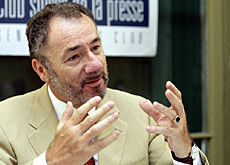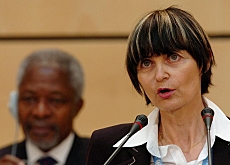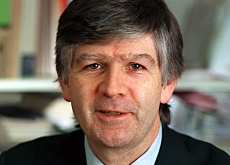Swiss encouraged by new human rights body

The two-week inaugural session of the United Nations Human Rights Council in Geneva ended on Friday and has been a success, according to the Swiss delegation.
However, the Swiss believe a lot remains to be done for the body to become completely operational – the greatest challenge being how to carry out human rights reviews of all 191 UN member states.
“The Council has passed its first test, but it’s still a work in progress,” said Blaise Godet, Switzerland’s ambassador to the UN in Geneva.
Godet, vice-president of the Council, declined to give a real overview of the first session, but he underlined that the 47 countries elected to the council on May 9 have until June 2007 to sort out all the operating procedures of the new UN body, created by the general assembly on March 15.
However, he noted that the atmosphere during the discussions had been marked by a desire for consensus, which contrasted sharply with the “dialogue between deaf people and lengthy monologues” of the widely discredited 60-year-old UN Human Rights Commission, which the Council replaced.
Jean-Daniel Vigny, from Switzerland’s mission to the international organisations in Geneva, summed up the new frame of mind. “The dialogue is now interactive, spontaneous, direct and reactive and it has been applied to several dossiers – this type of exchange never happened in the old institution.”
Vigny added however that non-governmental organisations (NGOs) had difficulty in following discussions due to a lack of representation.
Decisions
Council members took several decisions. Godet gave two examples, both supported by Switzerland.
On Thursday the Council overrode Canadian and Russian objections and passed a declaration to protect the rights of indigenous people around the world, including an assertion that they have a possible right to restitution for land and resources taken from them.
The Council also adopted a treaty to protect people against enforced disappearance. Once it has been approved by the UN general assembly, the accord will be opened in Paris for signature by governments, who will then be required to pass laws making enforced disappearance a criminal offence.
In addition Godet cited the one-year extension of the mandates of all the UN Special Rapporteurs – including Jean Ziegler, the outspoken Swiss Special Rapporteur on the Right to Food.
Godet said this avoided a “protection void” for victims while the new Council goes through its transitional period.
During this period, the 40 or so mandates will be evaluated by the Council and either strengthened – as the Swiss hope – or weakened – as the NGOs fear.
Swiss interest
The Swiss are keeping a particularly close eye on the main innovation of the Human Rights Council: regular human rights reviews of all 191 UN member states.
This is to be discussed at a conference in Lausanne organised by the Swiss government on August 28, which will be open to all UN member states and civil society.
This meeting – the fourth of its kind organised by Switzerland – aims to address a lot of the groundwork, which will facilitate the formal negotiations within the Council.
Vigny stressed that sorting out periodic human rights reviews was one of the most important tasks facing the Council.
“We need an effective and efficient universal mechanism,” he said. “All the states must be treated equally and they must all be reviewed in the course of their three-year mandate.”
By way of a conclusion, Godet highlighted one final positive aspect – that the role of NGOs had not been questioned.
He also promised that the Swiss delegation would commit itself to ensuring that its mandate be maintained and, if possible, strengthened.
swissinfo, Frédéric Burnand in Geneva
Switzerland was elected to the Human Rights Council with a three-year mandate on May 9. The vote took place at the UN General Assembly in New York.
The mandate can only be renewed once. Switzerland must then cede its place to another country from the western group, before being able to stand for election again.
In the second session in September, Switzerland will present a universal index of human rights containing more than 1,000 documents on how to run the new body.
The Human Rights Council sat for the first time in Geneva from June 19-30.
The council will meet at least three times a year for no less than ten weeks, and can convene emergency sessions. Its predecessor, the Human Rights Commission, met for just an annual six-week session.
The next sessions will take place September 18-October 6 and November 27-December 8.
Much of the initial two-week session of the 47-state body was devoted to planning future work, but its chairman, ambassador Luis Alfonso de Alba of Mexico, set aside time for examining current rights crises around the world.

In compliance with the JTI standards
More: SWI swissinfo.ch certified by the Journalism Trust Initiative











You can find an overview of ongoing debates with our journalists here . Please join us!
If you want to start a conversation about a topic raised in this article or want to report factual errors, email us at english@swissinfo.ch.